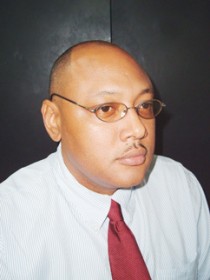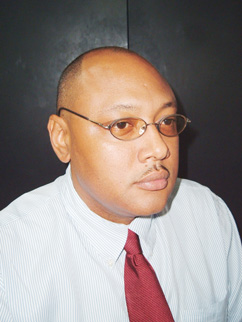-Trotman
In the light of the first ever conviction for money laundering leader of the Alliance For Change (AFC) Raphael Trotman is calling for the law to be tested against some of the bigger players in the drug world and said he hoped the administration would be putting pressure on the US justice system to offer up information that could result in the seizure of assets locally.
“There is enough for the Government of Guyana to make requests of their counterparts in the US, the same way we… have some action because Scotland Yard got involved… [We] should be putting pressure on Scotland Yard and the FBI and the Justice Department of the US to offer up evidence that could lead to asset seizure,” the AFC leader said recently to this newspaper.

It is good that the matters are coming up in court and “I am of the view if the case is proven beyond a reasonable doubt, and in a criminal case it has to be, then the law has to take its course.”
Trotman said the main issue was that persons were not being prosecuted, as he was certain that there were people “who should be brought under the net and are not being brought under the net.”
And GAP/ROAR parliamentarian, Everall Franklin, said that he would now expect other cases would be “swiftly activated.”
According to Franklin now that a threshold had been created it was expected that moves would be made in other directions.
“We know it is possible so let’s see what happens,” he told Stabroek News.
“The law is in place and we know apparently that the will is in place,” he added.
The parliamentarian however cautioned that when it came to the law one should not look for things, “to go in a certain order, as it depends on the evidence gathered and the evidence that is furnished to the DPP.”
Michelle Fraser last week Monday became the first person to be convicted of money laundering and was sentenced to seven years by Magistrate Hazel Octive-Hamilton.
The case involved US$280,000 which Fraser laundered for members of an international drug gang – some of whom had connections to Guyana – who were convicted and sentenced for drug trafficking in the UK. The case had seen two members of Scotland Yard coming to Guyana to testify. The UK gang, which was referred to as the ‘Bling Bling’ gang because of their lifestyle, was said to have trafficked in a huge quantity of cocaine and was reported as the biggest ever drug gang busted in the UK.
Fraser was charged under the 2000 Money Laundering Act and Director of Public Prosecution Shalimar Ali-Hack told Stabroek News last week that she was the first ever DPP to institute a money laundering charge.
The present act was only assented to by President Bharrat Jagdeo last year and Fraser had been charged since 2004.
When asked if she would be instituting any other such charges in the near future, Ali-Hack said that more persons were being investigated in relation to the same gang.
There have been calls for the authorities to seek to move against the assets of drug kingpin Roger Khan – who was reputed to own many businesses including a forestry concession on Koaw Island – Peter Morgan, David Narine and others who have recently been convicted of drug-trafficking in the US.
Stabroek News has repeatedly attempted to contact Director of the Financial Intelligence Unit (FIU) Paul Geer, whom Jagdeo recently criticised over his office’s failure to take any matter to court, but he is never in the office and most times calls are forwarded to his answering machine.
An emailed list of questions to the email listed on his answering machine have remained unanswered.
‘Zero tolerance’
“If indeed there was zero tolerance [by the administration] to money laundering, I am sure we would have seen far more action. The same way that there is zero tolerance on drug houses in depressed communities and the police are kicking down doors in these little communities, so too should we see zero tolerance to these money laundering crimes and so forth,” Trotman told Stabroek News.
“We need to be seeing across the board persons being held accountable for their actions; like I said not being prosecuted but prosecuted based on the respect for the rule of law, that I believe should be our standard,” he said.
Trotman again pointed out the police were targeting certain areas − mainly depressed areas − to conduct drug searches, but they do not show the same aggression in areas where the rich live.
“You’re rounding up some people yes, but they are like the small fry; the big fishes are driving round town in their Mercedes Benz and their BMWs and it is not happening with them,” Trotman said. He referred to former Home Affair’s Minister Gail Teixeira’s advice to persons to boycott the businesses of drug dealers.
“Obviously the government is in possession of information as to who these people are, and yet people sit down and see that they are only going after some, and in an ethnically divided society which has the added issue of poverty we don’t ever want one group to feel that they are the group that is being targeted, while another is allowed to break every law with impunity and get away with it,” he said.
He went on to comment that such a scenario did not help social cohesion, but rather “destroys the fragile social fabric of a country.” I say this because people have complained to me about that, and it is the perception and that is important.”
Trotman further stated that in Guyana the courts cannot initiate investigations and that “there is obviously a lack of political will to do anything about these matters, and so the court sits idly by and the few cases that do come to court either fizzle out, their files go missing or in the very, very rare cases you actually get a conviction.”

